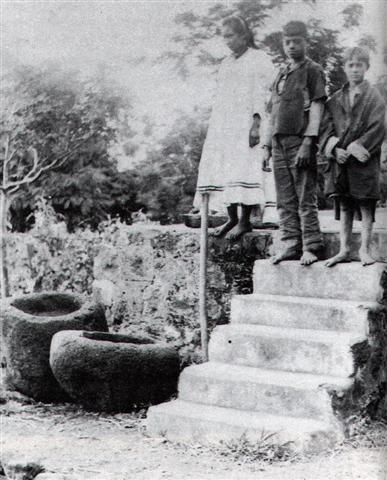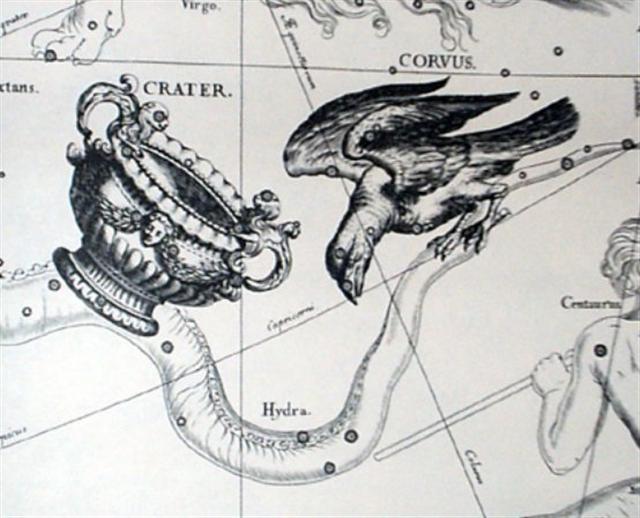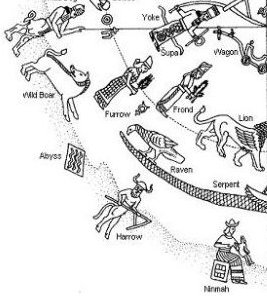In an agricultural economy it is necessary to have access to enough sweet water. Easter Island has no rivers or streams, and the volcanic character of the soil makes the water from the irregular rains disappear quickly down into the ground. Stone bowls (taheta) were used to collect the precious water.

The mechanism of rain
demands a high terrain against which the clouds (ao)
should rise, thereby forcing them to release their rain (ua).
Clouds at the horizon could reveal there was an island below the
horizon, a rule every Polynesian navigator knew. Ao-tea-roa
means a long white cloud.
... 'The rays drink up
the little waters of the earth, the shallow pools, making them
rise, and then descend again in rain.' Then, leaving aside the
question of water, he summed up his argument: 'To draw up and
then return what one had drawn - that is the life of the world.'
In a
spring of fresh water the Chorti diviners picked out 5 proper
stones, arranged them in the quincunx pattern, and later in the
year they
went on with gestures which probably were intended to
produce rain:
... On February 9
the Chorti Ah K'in, 'diviners', begin the agricultural
year. Both the 260-day cycle and the solar year are used in
setting dates for religious and agricultural ceremonies,
especially when those rituals fall at the same time in both
calendars. The ceremony begins when the diviners go to a sacred
spring where they choose five stones with the proper shape and
color. These stones will mark the five positions of the sacred
cosmogram created by the ritual. When the stones are brought
back to the ceremonial house, two diviners start the ritual by
placing the stones on a table in a careful pattern that
reproduces the schematic of the universe. At the same time,
helpers under the table replace last year's diagram with the new
one. They believe that by placing the cosmic diagram under the
base of God at the center of the world they demonstrate that God
dominates the universe.
The priests place
the stones in a very particular order. First the stone that
corresponds to the sun in the eastern, sunrise position of
summer solstice is set down; then the stone corresponding to the
western, sunset position of the same solstice. This is followed
by stones representing the western, sunset position of the
winter solstice, then its eastern, sunrise position. Together
these four stones form a square. They sit at the four corners of
the square just as we saw in the Creation story from the Classic
period and in the Popol Vuh. Finally, the center stone is placed
to form the ancient five-point sign modern researchers called
the quincunx ...

Later on in this
series of rituals, the Chorti go through a ceremony they
call raising the sky. This ritual takes place at midnight on the
twenty-fifth of April and continues each night until the rains
arrive. In this ceremony two diviners and their wives sit on
benches so that they occupy the corner positions of the cosmic
square. They take their seats in the same order as the stones
were placed, with the men on the eastern side and the women on
the west. The ritual actions of sitting down and lifting upward
are done with great precision and care, because they are
directly related to the actions done by the gods at Creation.
The people represent the gods of the four corners and the clouds
that cover the earth. As they rise from their seats, they
metaphorically lift the sky. If their lifting motion is uneven,
the rains will be irregular and harmful ...
By raising the sky also
the clouds would go up. They made their moves at
midnight and possibly this was because Aquarius was visible in the night and
not at the Sun. In rongorongo times the first star of Aquarius
(Albali, ε) rose with the Sun 314 days after 0h and there
the Extended Net was beginning:
 |
 |
 |
 |
| Ga3-6 |
Ga3-7 |
Ga3-8 |
Ga3-9 (68) |
| *APRIL 12 |
13 |
14 (104) |
15 |
| MAY 25 |
26 |
27 |
28 (148) |
| Āshleshā-9 / Willow-24 |
Al Nathrah-6 |
Extended Net-26a |
ι Cancri (132.0), ρ Hydrae (132.4) |
| π¹ Ursa Majoris, δ HYDRAE (129.6), Al Minhar al Shujā, Museida (129.9) |
BEEHIVE and M44 (130.4), Xestus (130.5), Ascellus Borealis (130.9) |
η Hydrae (131.0), Ascellus Australis (131.4), Koo She (131.6), ε HYDRAE (131.9) |
| July 28 |
29 |
30 |
31 (212) |
| 'July 1 |
3 |
3 |
4 (185) |
| NAKSHATRA DATES: |
| *OCTOBER 12 |
13 |
14 |
15 (288) |
| NOVEMBER 24 |
25 |
26 (330) |
27 |
| Rotanev, ι Delphini (312.3), τ Capricorni (312.6), κ Delphini (312.7), SVALOCIN, υ Capricorni, υ Pavonis (312.8) |
Deneb Cygni (313.5), β Pavonis (313.6), δ Delphini (313.8) |
Al Sa’d al Bula'-21 / Dhanishta-24 / Girl-10 |
Baten Algiedi (315.8) |
| Yue (314.3), Gienah Cygni, η Cephei (314.5), γ Delphini (314.6), σ Pavonis (314.7), ALBALI (314.8)
Betelgeuze
|
| January 27 (392) |
28 |
29 (*314) |
30 |
| 'December 31 (365) |
'January 1 |
2 |
3 |
 |
 |
 |
 |
 |
 |
 |
|
Ga3-10 |
Ga3-11 |
Ga3-12 |
Ga3-13 (72) |
π |
Ga3-15 |
Ga3-16 |
|
*APRIL 16 |
17 (107) |
18 |
19 |
20 |
21 |
22 |
|
MAY 29 |
30 (150) |
31 |
JUNE 1 |
2 |
3 |
4 |
|
no star
listed (133) |
ζ Hydrae (134.1), ρ Cancri (134.2), ο Cancri (134.6) |
ACUBENS,
Talitha Borealis (135.0), σ Cancri (135.2), ρ Ursa
Majoris (135.6) |
ν Cancri
(136.0), Talitha Australis (136.1), ω Hydrae (136.8) |
9h (137.0) |
no star
listed (138) |
π Cancri
(139.2), Miaplacidus (139.3), Tureis (139.8) |
|
σ¹ Ursa
Majoris (137.0), κ Cancri (137.3), τ Cancri (137.4),
Alsuhail (137.5), σ² Ursa Majoris (137.6), τ Ursa
Majoris (137.7),
ξ Cancri
(137.8) |
|
August 1 |
2 |
3 |
4 (216) |
5 |
6 |
7 |
|
'July 5 |
6 (187) |
5 |
|
NAKSHATRA
DATES: |
|
*OCTOBER 16 |
17 (290) |
18 |
19 |
20 |
21 |
22 |
|
NOVEMBER 28 |
29 |
30 |
DECEMBER 1 |
2 (336) |
3 |
4 |
|
μ
Aquarii (316.0) |
ε Equulei (317.8) |
no star listed (318) |
21h (319.6) |
χ Capricorni (320.0),
ν Aquarii (320.3), γ
Equulei (320.6), ο Pavonis (320.8) |
δ Equulei (321.7), φ
Capricorni (321.8) |
Kitalpha (322.0), Alderamin
(322.9) |
|
Armus (319.0), Dorsum
(319.3), Tsoo (319.7) |
|
January 31 |
February 1
(32) |
2 |
3 |
4 (400) |
5 |
6 |
|
'January 4 |
5 |
6 |
7 (372) |
8 |
9 |
10 |
 |
 |
|
Ga3-17 |
Ga3-18 (77) |
|
*APRIL
23 |
24 (114) |
|
JUNE 5 |
6 (157) |
|
no star
listed (140) |
Markab
Velorum (141.5), Al Minhar al Asad (141.6) |
|
August 8
(220) |
9 |
|
'July 12
(193) |
13 |
|
*OCTOBER
23 |
24 |
|
DECEMBER
5 |
6 |
|
Dai (323.5), β Equulei
(323.8) |
γ Pavonis (324.1), Yan
(324.6) |
|
February
7 (403) |
8 |
|
'January
11 |
12 (377) |
 |
 |
 |
 |
 |
 |
| Ga3-19 |
Ga3-20 |
Ga3-21 (80) |
Ga3-22 |
Ga3-23 |
Ga3-24 |
|
*APRIL 25 |
26 |
27 |
28 (118) |
29 (484) |
30 |
| JUNE 7 |
8 |
9 |
10 (161) |
11 |
12 |
| The Knot (Ukdah) |
ψ Leonis (146.4), Ras Elaset Australis (146.6) |
Vathorz Prior (147.9) |
| Star-25
ANA-HEU-HEU-PO |
Al Tarf-7 |
A Hydrae (144.1)
Vega
|
UKDAH (145.4), κ Hydrae (145.5), Subra (145.8) |
| ALPHARD (142.3), ω Leonis (142.6), τ¹ Hydrae (142.7) |
ψ Velorum (143.3), ALTERF, τ² Hydrae (143.4), ξ Leonis (143.5) |
| August 10 (222) |
11 |
12 |
13 |
14 |
15 |
| 'July 14 |
15 |
16 |
17 |
18 |
19 (200) |
| NAKSHATRA DATES: |
|
*OCTOBER 25 |
26 |
27 (300) |
28 |
29 |
30 |
| DECEMBER 7 |
8 |
9 |
10 |
11 (345) |
12 |
| BUNDA (Foundation) / KAKKAB NAMMAΧ (Star of Mighty Destiny) |
θ Piscis Austrini (330.1) |
| Al Sa'd al Su'ud-22 / Emptiness-11 |
no star listed (326) |
Castra (327.2), Bunda (327.5) Sirius
|
Nashira (328.0), Azelfafage, κ Capricorni (328.7) |
Enif, Erakis (329.2), 46 Capricorni, Jih (329.3), ι Piscis Austrini (329.4), λ Capricorni (329.6), ν Cephei (329.7), Deneb Algiedi (329.8) |
| Tsin (325.2), Alphirk (325.7), SADALSUD, ξ Gruis (325.9) |
|
February 9 (40) |
10 |
11 |
12 (408) |
13 |
14 |
|
'January
13 (378) |
14 |
15 |
16 |
17 |
18 |
 |
 |
 |
 |
 |
|
 |
 |
| Ga4-1 |
Ga4-2 (85) |
Ga4-3 |
Ga4-4 |
Ga4-5 |
Ga4-6 |
Ga4-7 (90) |
| *MAY 1 |
2 |
3 |
4 |
5 (125) |
6 |
7 |
| JUNE 13 |
14 |
15 |
16 |
17 (168) |
18 |
19 |
| υ¹ Hydrae (148.4), Ras Elaset Borealis (148.7) |
TSEEN KE (149.9) |
ν Leonis (150.1), π Leonis (150.6) |
υ² Hydrae (151.8) |
Al Jabhah-8 / Maghā-10 |
λ Hydrae (153.2) |
Adhafera, Tania Borealis, Simiram (154.7) |
| 10h (152.2) |
| AL JABHAH (152.4), Regulus (152.7) |
| August 16 |
17 (229) |
18 |
19 |
20 |
21 |
22 |
| 'July 20 (201) |
21 |
22 (7-22) |
23 |
24 |
25 |
26 |
| NAKSHATRA DATES: |
| *OCT 31 |
*NOV 1 |
2 |
3 |
4 (308) |
|
5 |
6 |
| LUCIA |
DECEMBER 14 |
15 |
16 (350) |
17 |
18 |
19 |
| Kuh (331.4), γ Gruis (331.5) |
no star listed (332) |
η Piscis Austrini (333.4) |
22h (334.8) |
ι Pegasi (335.0), Alnair (335.1), μ Piscis Austrini, υ Piscis Austrini (335.3), Woo (335.7), Baham, τ Piscis Austrini (335.8) |
ζ Cephei (336.2), λ Cephei (336.3), -/270 Lac. (336.7), λ Piscis Austrini (336.8) |
μ Gruis (337.0), ε Cephei (337.2), 1/325 Lac. (337.3), Ancha (337.4), α Tucanae (337.9) |
| Kae Uh (334.0), Al Kurhah (334.4), SADALMELIK, Al Dhanab (334.6), ι Aquarii, ν Pegasi (334.7) |
| February 15 |
16 |
17 (413) |
18 |
19 |
20 |
21 (52) |
| 'January 19 |
20 (385) |
21 |
22 |
23 |
24 |
25 |
 |
 |
 |
 |
| Ga4-8 |
Ga4-9 (92) |
Ga4-10 |
Ga4-11 |
| *MAY 8 |
9 |
10 (130) |
11 |
| JUNE 20 |
SOLSTICE |
22 (173) |
23 |
| Algieba, q Carinae (155.5) |
Tania Australis (156.0), GHOST OF JUPITER (156.8) |
Extended Net-26b |
Shir (158.9) |
| μ HYDRAE (157.1) |
| August 23 |
24 (236) |
25 |
26 |
| 'July 27 |
28 |
29 (210) |
30 |
| NAKSHATRA DATES: |
| *NOVEMBER 7 |
8 |
9 |
10 (131 + 183 = 314) |
| DECEMBER 20 |
SOLSTICE |
22 (356) |
23 |
| Al Sa'ad al Ahbiyah-23 / Shatabisha-25 |
β/172 Lac. (339.2), 4/1100 Lac. (339.4), π Aquarii (339.5)
Castor
|
δ Tucanae (340.1), ρ Cephei (340.2), ν Gruis (340.3), ζ Aquarii, δ Gruis (340.4), 5/1100 Lac. (340.7), σ Aquarii, 6/650 Lac. (340.9)
Procyon
|
α/91 Lac. (341.1), Homan, β Piscis Austrini (341.2), ν Tucanae (341.5), υ Aquarii (341.9) |
| ρ Aquarii (338.2), 2/365 Lac. (338.5), SADACHBIA (338.6), π Gruis (338.9) |
| February 22 |
23 (54) |
24 (420) |
25 |
| 'January 26 |
27 |
28 (393) |
29 |
 |
 |
 |
 |
| Ga4-12 |
Ga4-13 (96) |
Ga4-14 |
Ga4-15 |
| *MAY 12 |
13 |
5-14 (499) |
15 (135) |
| ST JOHN'S EVE |
JUNE 25 |
26 (177) |
27 |
| p Carinae (159.3) |
φ Hydrae (160.3) |
no star listed (161) |
Vathorz Posterior (162.1), Peregrini, η Carinae (162.6) |
| August 27 |
28 (240) |
29 |
30 |
| 'July 31 |
'August 1 |
2 (214) |
3 |
| NAKSHATRA DATES: |
| *NOVEMBER 11 |
12 |
13 |
14 (318) |
| CHRISTMAS EVE |
DECEMBER 25 |
26 (360) |
27 |
| η Aquarii (342.1), σ Gruis (340.4), Situla (342.7) |
ε Piscis Austrini (343.5), ο Pegasi, β Gruis (343.8) |
ρ Gruis (344.0), Matar (344.2), η Gruis (344.6) |
λ Pegasi (345.0), ξ Pegasi (345.1), ε Gruis (345.3), τ Aquarii (345.7), μ Pegasi (345.9) |
| February 26 |
27 |
28 (59) |
March 1 (425) |
| 'January 30 |
31 (396) |
'February 1 (32) |
2 |
Maybe
we
should
understand
empty
hands
raised
high
as
signs
pleading
for
rain.
Ga4-7
appears
to
visualize a
season
of
drought.
 |
 |
 |
 |
|
Ga4-16 |
Ga4-17 (100) |
Ga4-18 |
Ga4-19 |
|
*MAY
16 |
17
(137) |
18 |
19 |
|
JUNE
28 |
29
(180) |
30 |
JULY
1 |
|
ν
Hydrae (163.1) |
no
star listed (164)
Altair
|
Wings-27 |
ANA-TIPU |
|
ALKES
(165.6) |
Merak (166.2),
DUBHE
(166.7) |
|
August
31 |
September 1 |
2 |
3
(246) |
|
'August 4
(216) |
5 |
6 |
7 |
| NAKSHATRA DATES: |
|
*NOVEMBER 15 |
16
(320) |
17 |
18 |
|
DECEMBER 28 |
29 |
30
(364) |
31 |
|
ι Cephei (346.0), λ
Aquarii, γ Piscis Austrini, σ Pegasi (346.5) |
Scheat Aquarii
(347.0), ρ Pegasi (347.2),
δ Piscis Austrini (347.4), Fomalhaut, τ Gruis
(347.8) |
Fum al
Samakah (348.3), ζ Gruis (348.5), ο Andromedae
(348.9) |
Al
Fargh al Mukdim-24 /
Purva Bhādrapadā-26 /
House-13 |
|
Scheat
Pegasi, π Piscis
Austrini (349.3), κ Gruis (349.4),
MARKAB PEGASI
(349.5) |
|
March 2 |
3
(427) |
4 |
5
(64) |
|
'February 3 |
4 (400) |
5
(36) |
6 |
A common mythic theme was the absence of
sweet water at Corvus, arriving not long after the empty Crater,
and both constellations were located at the tapering tail of the
Great Water Serpent:

... There
was no water in the village. The lakes and rivers were
dry. Raven and Crow, two young girls who were having
their first menstrual courses, were told to go and draw
water from the ocean. Finding the journey too long,
Raven decided just to urinate into her basket-bucket.
She decieved no one and was severly scolded. Crow
returned much later but with drinking water. As a
punishment, Raven was condemned never to find water in
the summer; only in winter would she find something to
drink. For that reason the Raven never drinks during the
hot months; she speaks with a raucous voice because of
her dry throat ...
... the
bird, being sent with a cup for water, loitered at a
fig-tree till the fruit became ripe, and then returned
to the god with a water-snake in his claws and a lie in
his mouth, alleging the snake to have been the cause of
the delay. In punishment he was forever fixed in the sky
with the Cup and the Snake; and, we may infer, doomed to
everlasting thirst by the guardianship of the Hydra over
the Cup and its contents. From all this came other
poetical names for our Corvus - Avis Ficarius,
the Fig Bird; and Emansor, one who stays beyond
his time; and a belief, in early folk-lore, that this
alone among birds did not carry water to its young
...

|



























